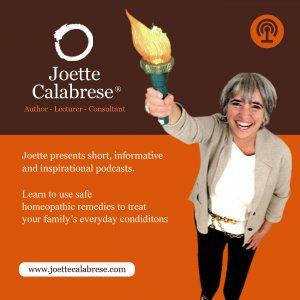Joette Calabrese Podcast

Podcast 98 – How to Take Your Own Case: Prioritize!
In this podcast, we cover:
01:27 Fictional Girl Named Maddy
05:58 Number Rating System
15:58 Food Intolerance
18:58 Determining what is most important
25:06 Sprezzatura
Kate: This is the Practical Homeopathy® Podcast Episode Number 98 with Joette Calabrese.
Joette: This is Joette Calabrese, and I’d like to welcome you to the Practical Homeopathy® Podcast. Women and men worldwide are taking back control of their families’ health and learning how to heal their bodies naturally, safely and effectively.
So, if you’re hungry to learn more, you’ve come to the right place. Stay tuned as we give you the tools — and the inspiration — you need as I share my decades of experience and knowledge using this powerful medicine we call homeopathy.
Kate: Hi, this is Kate, and I want to welcome you back to the Practical Homeopathy® podcast. I'm here with Joette today.
Hi, Joette!
Joette: Hi, Kate, always great to talk like this.
Kate: Yes, we have so much fun on these podcasts.
Today, we are going to be talking about what it's like when you first start using homeopathy, and you are so excited. Right? You finally found homeopathy, and you're so excited. You're trying it for some conditions, and it’s working.
And now, you want to treat everything, right?
Joette: Now let's make our bodies perfect and live forever.
Fictional Girl Named Maddy
Kate: Right.
So, what we're going to do today is we're going to talk about this fictional girl named Maddy. I'm going to give you an example of a case, Joette.
We see this all the time. I'm sure you do. I hear people in the Study Groups who get excited, and then they want to treat everything. They want to heal every single symptom that they have, their family members have, their friends have — which is great, right?
Joette: But enthusiasm needs to be tempered sometimes, and we have to pull back and be a little more logical.
Kate: We're going to flesh this out. I'm just giving you an example, Joette.
Maddy has osteoarthritis, right? She has pain in her joints. She has food intolerances which gives her bloating and gas. She has alopecia so maybe some thyroid issues. She has white spots on her nails. She's 20 pounds overweight. She doesn't sleep well at night, and she has a little patch of eczema on her neck or her back.
Joette: How old is Maddy? It's most likely that Maddy is not in her 20s. It can happen. But most likely the osteoarthritis is usually the tipoff that she's older. She's postmenopausal. She's in her 60s, most likely 20 pounds overweight. All of this is super-common for someone in the late 60s, for example. (This is fictitious, right?)
Kate: Exactly.
Joette: Maddy is not real, so let's put her exactly where she would fit in the scope of demographic. I would say Maddy is probably about 65.
Kate: You see a lot of Maddys, I would imagine, Joette, because this may be some typical conditions that people in that age range are dealing with, yes?
Joette: Yes. You know what you didn't mention about Maddy? My guess is that she's got anxiety, too.
Kate: Of course, she does.
Joette: You bet. You bet. Things that come her way or her family's way, she worries about her grandchildren. You know, it keeps her up at night sometimes. You did say insomnia, right? Yes, she has insomnia.
Kate: Maddy is really excited, Joette. She's just taken some of your courses. She joined your Study Groups.
Joette: Down, Maddy. Down!
Kate: She's listened to all the podcasts, read the blogs,






 Visit Podcast Website
Visit Podcast Website RSS Podcast Feed
RSS Podcast Feed Subscribe
Subscribe
 Add to MyCast
Add to MyCast